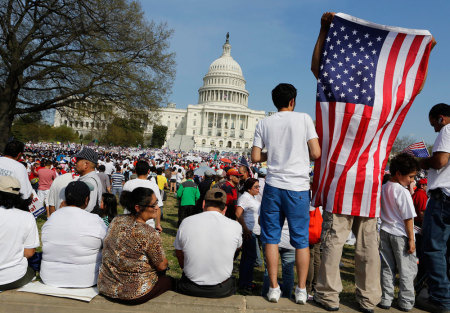Immigrants have more stable families than native-born Americans: study

Immigrant families tend to be more stable than families of native-born Americans, a new analysis of census data by the Institute of Family Studies shows, and it’s not because of money or education.
While higher incomes and education are known to drive family stability, the analysis presented Wednesday by Wendy Wang, the institute’s director of research, found that immigrants tend to have a more stable family life than native-born Americans because they are more likely than native-born Americans to embrace a culture of family first.
“The familism that immigrants embrace not only provides them a safe harbor when facing the challenges as newcomers, it also helps to provide a better environment for their children to advance in life,” Wang wrote.
The analysis shows that of the 45 million immigrants in the U.S. today, some 72% of them who have children are still in their first marriage compared with just 60% of native-born Americans with children.
Not all immigrant families, however, were found equal on the stability scale.
A review of the 30 largest groups of working-age immigrants in the U.S. shows that first-generation immigrants from Asia ranked the highest among stable families, with Indian immigrant families leading the pack. Some 94% of this group were found to be stably married while just 4% were remarried and only 2% were unmarried.
More than 80% of immigrant families from Bangladesh, Pakistan, Taiwan, Korea, China, and Japan were also stably married. Immigrants from the Middle East, South America, and Nigeria also ranked highly on the family stability scale.
Immigrant families from Mexico, with 68% stability, and Caribbean countries, such as Jamaica, Cuba and the Dominican Republic with an average stability score of about 50%, tended to be less stable.
When asked if the proximity of the Caribbean and Mexico to U.S. culture could explain the disparity in family stability between immigrants from Asia and those from the Caribbean and Mexico, Wang said it could be a factor.
“I do think that might have something to do with the specific culture, but it’s a little hard to measure because I’m a demographer,” she told The Christian Post on Thursday.
In terms of her analysis Wednesday, however, she said the distinction between the families of native-born Americans and immigrant families is clear.
“The individualism in American culture has its virtues but is at odds with stable marriage and families. As we know, marriage is not only about personal happiness and fulfillment but also family solidarity,” she wrote.
She cited an IFS survey conducted in California, showing nearly 70% of immigrants stating that it is very important for them to be married before having children, compared with 62% of native-born Californians. They were also found to be more likely than native-born Californians to believe that couples with children should make every effort to stay married.
That same survey also found that couples who believe that “marriage is mostly about an intense emotional/romantic connection between two adults” were at a higher risk of divorce than those who believe that marriage is about romance but also about “the kids, money, and raising a family together.”
“I believe if we do a national survey, we’ll find similar results, which is that the immigrants are more likely to have this family first mindset and they believe in traditional values and are more likely to view family as really important,” Wang told CP.
“Most people who study immigrants don’t pay attention to the strength of the family part,” she added. “I think immigrants make a big contribution to the overall American society. … The family values that immigrants bring really help the overall family stability in the U.S.”





















